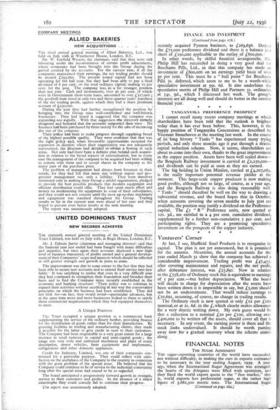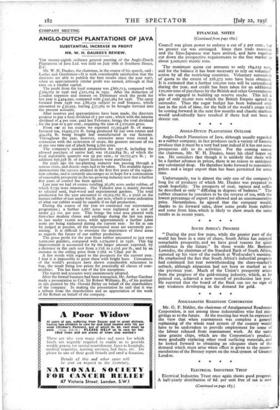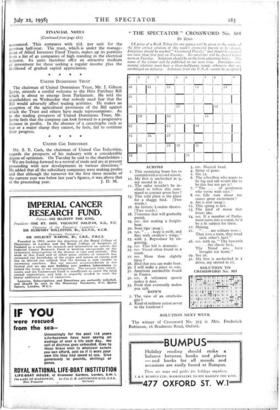FINANCIAL NOTES
THE SUGAR AGREEMENT
THE sugar-exporting- countries of the world have succeeded, not without difficulty, in making the cuts in exports estimated to be. necessary in-, the year ending August; -1939.- ,A ;year am :when the International Sugar 'Agreement was Wattled, the hearts of the delegates were filled with optimism, and they fixed the world export quota to the " free market," that is, world exports • less preferential sugar, at the rather high figure of 3,682,500 metric tons. The International Su_gar
{Continued onpage 182..) FINANCIAL NOTES (Continued from page i80.)
Council was given power to enforce a cut of 5 per cent., but no greater cut was envisaged. Since then trade recession and the Sino-Japanese war have arrived, and have together cut down the prospective requirements to the free market to about 3,000,000 metric tons.
The maximum quota cut amounts to only 184,125 tons, and for the balance it has been necessary to rely on voluntary action by all the restricting countries. Voluntary surrenders of quota to the extent of 228,375 tons have been obtained. It is estimated that a further roo,000 tons will be surrendered during the year, and credit has been taken for an additional 15o,000 tons of purchases by the British and other Governments who are engaged in building up reserve stocks. This left a gap of only zo,000 tons which the British Empire agreed to surrender. Thus the sugar budget has been balanced only just in the nick of time, for the bulk of the world's crops will be coming forward in the next few months and chaotic markets would undoubtedly have resulted if there had not been a drastic cut.
* * * *
ANGLO-DUTCH PLANTATIONS OUTLOOK
Anglo-Dutch Plantations of Java, although usually regarded as a rubber company, in fact produces such a variety of Eastern , produce that it must be a very bad year indeed if it has not some prosperous side to its activities. For the coming season the chairman, Mr. W. H. Daukes, bases his chief hopes on tea. He considers that though it is unlikely that there will be a further advance in prices, there is no reason to anticipate -any substantial drop. He therefore looks forward to reasonable prices and a larger export than has been permitted for some time. -
Unfortunately, tea is almost the only one of the company's long list of products of which Mr. Daukes was prepared to speak hopefully. The prospects of sisal, tapioca and coffee he described as only " differing in degrees of badness." The rubber situation he considers to be-the reverse of tea, With the lowest percentage of export yet allowed and an unremunerative price. Nevertheless, he agreed that -the company would, thanks to its forward sales, draw some profit from rubber and some from kina, which is likely to show, much the same results as in recent years. - * * SOUTH AFRICA'S PROGRESS " During the past few years, while the greater part of the world has been in a state of chaos, South Africa has enjoyed remarkable prosperity, and we have good reasons for quiet confidence in the future." In those words Mr. Bertram Lowndes, the chairman of the Standard Bank of South Africa, summed up his view of the outlook at Wednesday's meeting. He emphasised the fact that South Africa's industrial progress had continued last year notwithstanding the share-market's setback, although expansion had not been so marked- as in the previous year. Much of the Union's prosperity arises from the progress of the gold-mining industry, which, as he pointed out, achieved a new record of production last year. He reported that the board of the Bank can see no sign of any weakness developing in the demand for gold.
* * * * AMALGAMATED ROADSTONE CORPORATION Mr. G. F. Nalder, the chairman of Amalgamated Roadstone Corporation, is not among those industrialists who feel_ mis- givings as to the future. At the meeting last week he expressed the view that when rearmament was , complete a general replanning of the whole road system of the country would have to be undertaken to provide employment for -some of the labour released from rearmament work. At the same time granite chips, which are the Corporation's product, were gradually replacing other road surfacing materials, and he looked forward to obtaining an adequate share of the demand which must arise when cffect is given to the recom- mendations of the Bressey report on the road system of Greater London.
* *.
- - ELECTRICAL- INDUSTRIES TRUST Electrical Industries Trust once again shovis good progress. A half-yearly distribution of 6d. per unit free of tax is now
(Continued on page 583) FINANCIAL NOTES (Continued from page 182)
announced. This compares with 31d. per unit for the previous half-year. The trust, which is under the manage- ment of Allied Investors Fixed Trusts, makes up its portfolio from a ,list of 41 companies of high standing in the electrical industry. Its units therefore offer an attractive medium of investment for those seeking a regular income plus the likelihood of gradual capital appreciation.
UNITED DOMINIONS TRUST
The chairman of United Dominions Trust, Mr. J. Gibson Jarvie, extends a cordial welcome to the Hire Purchase Bill which is about to emerge from Parliament. He told the shareholders on Wednesday that nobody need fear that the Bill would adversely affect trading activities. He makes an exception of the agricultural provisions of the Bill against which the Trust and others have made representations. As to the trading prospects of United Dominions Trust, Mr. Jarvie feels that the company can look forward to a progressive increase in profits. In the absence of a catastrophe such as war or a major slump they cannot, he feels, fail to continue their progress.
UNITED GAS INDUSTRIES Mr. S. E. Cash, the chairman of United Gas Industries, regards the prospects of his industry with a considerable degree of optimism. On Tuesday he said to the shareholders :
We are looking forward to a revival of trade and are at present proceeding with new developments in various directions." He added that all the subsidiary companies were making profits and that although the turnover for the first three months of the current year was below last year's figures, it was above that













































 Previous page
Previous page